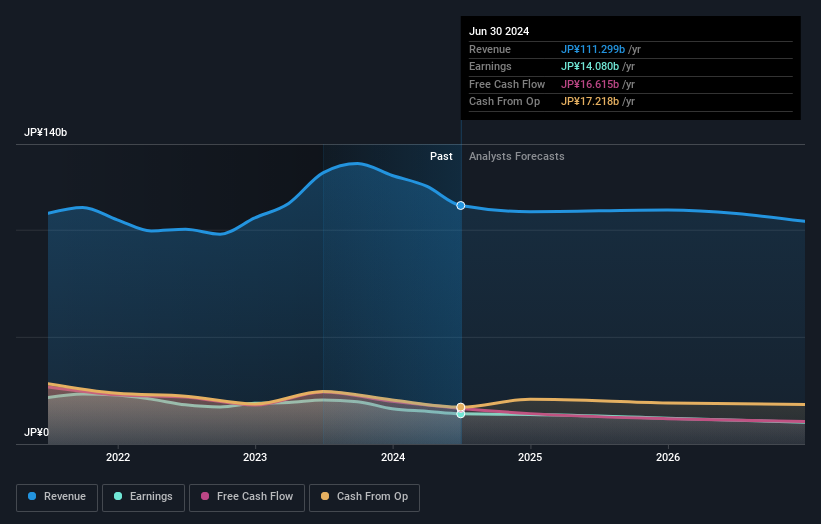GungHo Online Entertainment, Inc.'s (TSE:3765) 7.8% gain last week benefited both retail investors who own 39% as well as insiders
Key Insights
- The considerable ownership by retail investors in GungHo Online Entertainment indicates that they collectively have a greater say in management and business strategy
- 51% of the business is held by the top 8 shareholders
- Insiders own 27% of GungHo Online Entertainment
To get a sense of who is truly in control of GungHo Online Entertainment, Inc. (TSE:3765), it is important to understand the ownership structure of the business. And the group that holds the biggest piece of the pie are retail investors with 39% ownership. Put another way, the group faces the maximum upside potential (or downside risk).
Following a 7.8% increase in the stock price last week, retail investors profited the most, but insiders who own 27% stock also stood to gain from the increase.
In the chart below, we zoom in on the different ownership groups of GungHo Online Entertainment.
Check out our latest analysis for GungHo Online Entertainment

What Does The Institutional Ownership Tell Us About GungHo Online Entertainment?
Institutional investors commonly compare their own returns to the returns of a commonly followed index. So they generally do consider buying larger companies that are included in the relevant benchmark index.
We can see that GungHo Online Entertainment does have institutional investors; and they hold a good portion of the company's stock. This suggests some credibility amongst professional investors. But we can't rely on that fact alone since institutions make bad investments sometimes, just like everyone does. It is not uncommon to see a big share price drop if two large institutional investors try to sell out of a stock at the same time. So it is worth checking the past earnings trajectory of GungHo Online Entertainment, (below). Of course, keep in mind that there are other factors to consider, too.

GungHo Online Entertainment is not owned by hedge funds. Taizo Son is currently the company's largest shareholder with 25% of shares outstanding. In comparison, the second and third largest shareholders hold about 8.2% and 6.3% of the stock. Furthermore, CEO Kazuki Morishita is the owner of 1.8% of the company's shares.
We also observed that the top 8 shareholders account for more than half of the share register, with a few smaller shareholders to balance the interests of the larger ones to a certain extent.
While studying institutional ownership for a company can add value to your research, it is also a good practice to research analyst recommendations to get a deeper understand of a stock's expected performance. There are plenty of analysts covering the stock, so it might be worth seeing what they are forecasting, too.
Insider Ownership Of GungHo Online Entertainment
The definition of company insiders can be subjective and does vary between jurisdictions. Our data reflects individual insiders, capturing board members at the very least. The company management answer to the board and the latter should represent the interests of shareholders. Notably, sometimes top-level managers are on the board themselves.
I generally consider insider ownership to be a good thing. However, on some occasions it makes it more difficult for other shareholders to hold the board accountable for decisions.
It seems insiders own a significant proportion of GungHo Online Entertainment, Inc.. Insiders own JP¥50b worth of shares in the JP¥185b company. That's quite meaningful. It is good to see this level of investment. You can check here to see if those insiders have been buying recently.
General Public Ownership
The general public, who are usually individual investors, hold a 39% stake in GungHo Online Entertainment. While this group can't necessarily call the shots, it can certainly have a real influence on how the company is run.
Private Equity Ownership
Private equity firms hold a 8.2% stake in GungHo Online Entertainment. This suggests they can be influential in key policy decisions. Some investors might be encouraged by this, since private equity are sometimes able to encourage strategies that help the market see the value in the company. Alternatively, those holders might be exiting the investment after taking it public.
Next Steps:
It's always worth thinking about the different groups who own shares in a company. But to understand GungHo Online Entertainment better, we need to consider many other factors. Case in point: We've spotted 1 warning sign for GungHo Online Entertainment you should be aware of.
Ultimately the future is most important. You can access this free report on analyst forecasts for the company.
NB: Figures in this article are calculated using data from the last twelve months, which refer to the 12-month period ending on the last date of the month the financial statement is dated. This may not be consistent with full year annual report figures.
Have feedback on this article? Concerned about the content? Get in touch with us directly. Alternatively, email editorial-team (at) simplywallst.com.
This article by Simply Wall St is general in nature. We provide commentary based on historical data and analyst forecasts only using an unbiased methodology and our articles are not intended to be financial advice. It does not constitute a recommendation to buy or sell any stock, and does not take account of your objectives, or your financial situation. We aim to bring you long-term focused analysis driven by fundamental data. Note that our analysis may not factor in the latest price-sensitive company announcements or qualitative material. Simply Wall St has no position in any stocks mentioned.
 Index Options
Index Options CME Group
CME Group Nasdaq
Nasdaq Cboe
Cboe TradingView
TradingView Wall Street Journal
Wall Street Journal